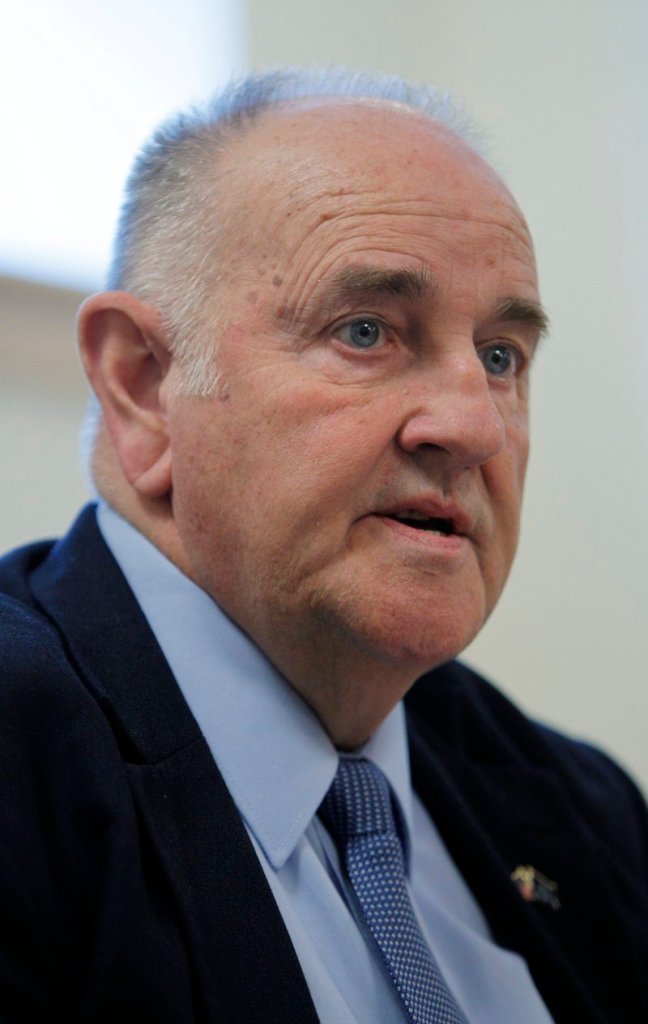AUGUSTA – Top budget officials in Gov.-elect Paul LePage’s administration laid out familiar priorities Friday that include increasing private sector jobs, shrinking the size of government and not raising taxes.
Budget team co-chairmen Tarren Bragdon and Sawin Millett said they are also mindful of long-term goals, such as finding a way to reduce income taxes, pay back the state’s hospital and pension debt and provide a predictable source of revenue to schools and municipalities.
Increasing jobs in the private sector will be a priority for the new Republican administration, Millett said.
“That will be an outcome we will be constantly focused upon,” he said.
Millett said efforts are being made to ensure that the “truly needy” get help, but LePage’s team is considering changes to Medicaid in the areas of eligibility, reimbursements and service delivery.
The 10-member team is preparing two budgets.
One will ensure that the state budget that ends June 30 stays in balance. That supplemental budget will be released within two weeks of LePage’s inauguration on Jan. 5, Bragdon said.
The two-year budget covering July 1, 2011, through June 30, 2013, will be released in the first week of February, he said.
The budget team is considering 150 money-saving ideas and working to study how much money each proposal would save and which ones are feasible.
Millett said some savings initiatives begun by Gov. John Baldacci will be continued, such as a hiring freeze and continued state work force reductions through attrition. Along with that, Bragdon said, LePage’s aides are examining how to further reduce the work force and what kinds of services don’t need to be provided by the state.
“If you’re going to have them do with less people, you’re going to have to have them do less activity,” he said.
When it comes to tax reductions, Republicans say they want a structural framework that allows income taxes to be reduced over time as the economy recovers.
Addressing the state’s $4.4 billion unfunded pension liability, Millett said that under the current payback schedule, it will cost nearly $9 billion to meet the obligation because of interest. The Maine Constitution requires the government to pay back the money by 2028, but Millett hopes it can adopt a more aggressive schedule.
Another issue is paying off debt to hospitals by taking advantage of federal Medicaid match rates early next year, he said.
Budget numbers continue to fluctuate as revenues change and the budget team considers new requests for funding from state agencies.
There are now requests for more than $100 million in a supplemental budget package, Millett said.
The gap that has to be filled in the next two years is about $800 million. The revenue assumptions are based on the extension of the Bush tax cuts for two years, which is pending in Congress, Millett said.
House Minority Leader Emily Cain, D-Orono, said Democrats are awaiting more details, particularly with regard to how Republicans will define who is “truly needy.”
“Those things cause me to raise my eyebrows and wait for more information,” she said. “Democrats want to be part of a productive budget process.”
MaineToday Media State House Writer Susan Cover can be contacted at 620-7015 or at:
scover@mainetoday.com
Send questions/comments to the editors.




Success. Please wait for the page to reload. If the page does not reload within 5 seconds, please refresh the page.
Enter your email and password to access comments.
Hi, to comment on stories you must . This profile is in addition to your subscription and website login.
Already have a commenting profile? .
Invalid username/password.
Please check your email to confirm and complete your registration.
Only subscribers are eligible to post comments. Please subscribe or login first for digital access. Here’s why.
Use the form below to reset your password. When you've submitted your account email, we will send an email with a reset code.